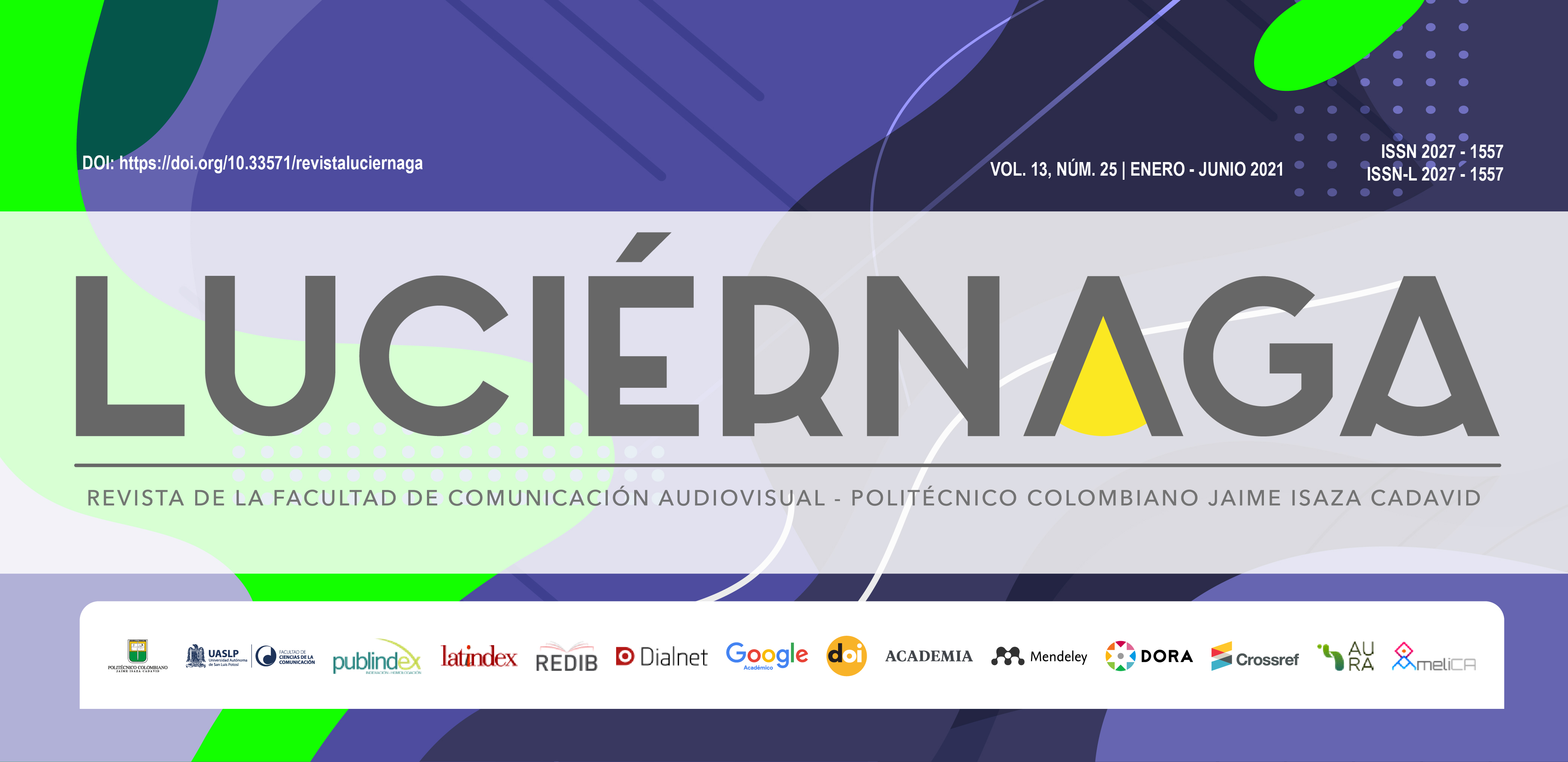Factores de riesgo y uso de internet en estudiantes universitarios de Puerto Rico y España
DOI:
https://doi.org/10.33571/revistaluciernaga.v13n25a2Keywords:
Internet addiction, academic procrastination, depression; anxiety, stress, self-controlAbstract
Risk factors for internet use in university students from Puerto Rico and Spain were analyzed. The Internet Addiction Test (IAT), Brief Self-Control Scale (BSCS), Depression, Anxiety and Stress Scale (DASS-21) and Academic Procrastination Scale (APS) instruments were used for the purpose of the research. Binomial logistic regression analyzes were performed to determine how self-control, depression, anxiety and stress, and procrastination explain internet addiction (IAT) as a predictor model in university students from Puerto Rico and Spain. The results indicated that self-control predicts the Internet addiction of Puerto Rican students. Depression, anxiety and stress predict internet addiction in Spanish students. For the Total model (Spain and Puerto Rico) it was shown that the BSCS and DASS scores predict internet addiction in students from both
countries.
Article Metrics
Abstract: 497 PDF (Español (España)): 290PlumX metrics
References
Antony, M. M., Bieling, P. J., Cox, B. J., Enns, M. W., & Swinson, R. P. (1998). Psychometric properties of the 42-item and 21-item versions of the Depression Anxiety Stress Scales in clinical groups and a community sample. Psychological Assessment, 10, 176–181. http://dx.doi.org/10.1037/1040-3590.10.2.176
Aznar-Díaz I, Romero-Rodríguez J-M, García-González A, Ramírez-Montoya M-S (2020). Mexican and Spanish university students’ Internet addiction and academic procrastination: Correlation and potential factors. PLoS ONE ,15(5). https://doi.org/10.1371/journal.pone.0233655
Crawford, J. R., & Henry, J. D. (2003). The Depression Anxiety Stress Scales (DASS): Normative data and latent structure in a large nonclinical sample. British Journal of Clinical Psychology, 42, 111–131. http://dx.doi.org/10.1348/014466503321903544
Del Valle, M. V., Galli, J. I., Urquijo, S., & Canet Juric, L. (2019). Adaptación al español de la Escala de Autocontrol y de la Escala de Autocontrol-Abreviada y evidencias de validez en población universitaria. Revista Argentina De Ciencias Del Comportamiento, 11(2), 52–64. https://doi.org/10.32348/1852.4206.v11.n2.23413
Estela Saavedra, S. N. y Aldazábal Barbarán, K. M. (2021). Adicción a Internet asociada a depresión en estudiantes universitarios de Lima durante el período setiembre a noviembre 2020 [Tesis doctoral, Universidad Ricardo Palma]. https://repositorio.urp.edu.pe/bitstream/handle/URP/3809/ESTELASAAVEDRA.pdf?sequence=1&isAllowed=y
Field, A. (2018). Discovering Statistics using IBM SPSS Statistics (5th edition). Sage Publications, Estados Unidos.
García-Santillán, A. (2020). Addiction towards internet: Empirical evidence in high school students: A parametric analysis. Journal of psychological and Educational Research. 28(1), 97-124.
Lovibond, P. F., & Lovibond, S. H. (1995). Manual for the Depression Anxiety Stress Scales (2nd ed.). Book, Sydney: Psychology Foundation.
Johnson, R. y Christensen, L. (2019). Educational Research: Quantitative, Qualitative, and Mixed Approaches (7th edition). Sage Publications, Estados Unidos.
McMillan, J. H. (2015). Fundamentals of Educational Research (7 ed.). Estados Unidos: Pearson Addison Wesley.
Moura, Giovanna Barroca de, Paiva, Tamyres Tomaz, & Dominguez-Lara, Sergio. (2021). Validation of the factorial structure of the Procrastination Scale in Brazilian university students. Psicología, Conocimiento y Sociedad, 11(2), 40-54.
Polo M.I., Mendo S., León B. & Castaño E.F. (2017). Mobile abuse in university students and profiles of victimization and aggression. Addictions. 29(4), 245–255. https://doi.org/10.20882/adicciones.837PMID:28170054
Puerta-Cortés, D. X., Carbonell, X. y Chamarro, A. (2012). Análisis de las propiedades psicométricas de la versión en español del Internet Addiction Test. Trastornos Adictivos,14(4), 99-104.
Rahmatullah Haand & Zhao Shuwang (2020). The relationship between social media addiction and depression: a quantitative study among university students in Khost, Afghanistan, International Journal of Adolescence and Youth, 25(1), 780-786, https://doi.org/10.1080/02673843.2020.1741407
Román Mella, Francisca, & Vinet, Eugenia V., & Alarcón Muñoz, Ana María (2014). Escalas de Depresión, Ansiedad y Estrés (DASS-21): Adaptación y propiedades psicométricas en estudiantes secundarios de Temuco. Revista Argentina de Clínica Psicológica, 23(2),179-190.
Scholten, S., Velten, J., Bieda, A., Zhang, X. and Margraf, J. (2017). Testing Measurement Invariance of the Depression, Anxiety, and Stress Scales (DASS-21) Across Four Countries. American Psychological Association, 29(11), 1376–1390 http://dx.doi.org/10.1037/pas0000440
Steel, P. (2007). The nature of procrastination: A meta-analytic and theoretical review of quintessential self-regulatory failure. Psychological Bulletin, 133, 65–94. http:// dx.doi.org/10.1037/0033-2909.133.1.65
Tangney, J. P., Baumeister, R. F., & Boone, A. L. (2004). High self-control predicts good adjustment, less pathology, better grades, and interpersonal success. Journal of personality, 72(2), 271–324. https://doi.org/10.1111/j.0022-3506.2004.00263.x
Yockey R. D. (2016). Validation of the Short Form of the Academic Procrastination Scale. Psychological reports, 118(1), 171–179. https://doi.org/10.1177/0033294115626825
Young, K. S. (1998). Internet addiction: the emergence of a new clinical disorder. Cyberpsychology & Behavior, 1(3), 237-244.
Young, K., & Rogers, R. (2017). Internet addiction test manual.
Young, K., & Rogers, R. (2009). The Relationship Between Depression and Internet Addiction. Cyberpsychology & Behavior, 1(1), 25-28. https://doi.org/10.1089/cpb.1998.1.25
Downloads
Published
How to Cite
Issue
Section
License
Copyright (c) 2021 Luciérnaga Comunicación

This work is licensed under a Creative Commons Attribution-NonCommercial-ShareAlike 4.0 International License.
Aquellos autores/as que tengan publicaciones con esta revista, aceptan los términos siguientes:- Los autores/as conservarán sus derechos de autor y garantizarán a la revista el derecho de primera publicación de su obra, el cuál estará simultáneamente sujeto a una licencia de Creative Commons Atribución – No comercial – Compartir igual
que permite a terceros compartir la obra siempre que se indique su autor y su primera publicación en esta revista. - Los autores/as podrán adoptar otros acuerdos de licencia no exclusiva de distribución de la versión de la obra publicada (p. ej.: depositarla en un archivo telemático institucional o publicarla en un volumen monográfico) siempre que se indique la publicación inicial en esta revista.
- Se permite y recomienda a los autores/as difundir su obra a través de Internet (p. ej.: en archivos telemáticos institucionales o en su página web) antes y durante el proceso de envío, lo cual puede producir intercambios interesantes y aumentar las citas de la obra publicada. (Véase El efecto del acceso abierto)
- Luciérnaga-Comunicación no cobra tasas o cargos a Autores o colaradores por la recepción, revisión o publicación de artículos (APC -Article Processing Charges/ publication fee).

















